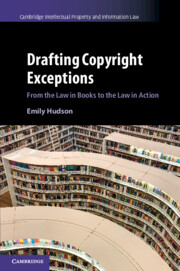Book contents
- Drafting Copyright Exceptions
- Cambridge Intellectual Property and Information Law
- Drafting Copyright Exceptions
- Copyright page
- Dedication
- Contents
- Preface
- Table of Cases
- Table of Statutes
- Part I Background
- Part II The Law in Action
- Part III The Future
- 8 New Norms and Practices
- 9 Drafting Copyright Exceptions
- Appendix Empirical Methodology
- Bibliography
- Index
- Cambridge Intellectual Property and Information Law
9 - Drafting Copyright Exceptions
from Part III - The Future
Published online by Cambridge University Press: 31 March 2020
- Drafting Copyright Exceptions
- Cambridge Intellectual Property and Information Law
- Drafting Copyright Exceptions
- Copyright page
- Dedication
- Contents
- Preface
- Table of Cases
- Table of Statutes
- Part I Background
- Part II The Law in Action
- Part III The Future
- 8 New Norms and Practices
- 9 Drafting Copyright Exceptions
- Appendix Empirical Methodology
- Bibliography
- Index
- Cambridge Intellectual Property and Information Law
Summary
In the previous five chapters, it has been observed that there are significant differences in the ways that cultural institutions in Australia, Canada, the United Kingdom and the United States utilise copyright exceptions. The aim of this final chapter is to analyse why these differences have arisen and what this means for the drafting of copyright exceptions, in particular the respective merits of open- and closed-ended drafting. As discussed in detail by Robert Burrell and Allison Coleman, concerns about the operation of specific exceptions have led to repeated calls for legislatures to enact fair use, which is often seen as offering a ‘panacea’ to the ills commonly associated with closed-ended drafting. There is undoubtedly truth in the proposition that certain characteristics tend to be associated with certain forms of drafting, for instance that general exceptions have the advantage of flexibility but can lack predictability, whilst specific exceptions have greater certainty but can be rigid and non-responsive. However, as noted by Burrell and Coleman, this understanding of exceptions can reflect an oversimplified view of the law.
- Type
- Chapter
- Information
- Drafting Copyright ExceptionsFrom the Law in Books to the Law in Action, pp. 308 - 338Publisher: Cambridge University PressPrint publication year: 2020



